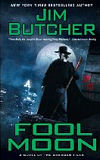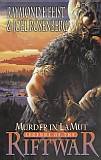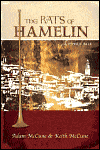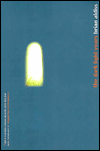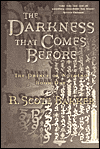
The Darkness That Comes Before, by R. Scott Bakker
Book Review by Jeff Edwards
Have you read this book?
An ancient evil reawakens and a Holy War brews in R. Scott Bakker's The Darkness That
Comes Before. Bakker has created a true epic full of intrigue and murder, political plotting
and bloody battles, a generations-old need for revenge, and friendships that surmount prejudice.
Potential readers beware: this is not breezy, escapist entertainment - it's a heavy tome, the first of three parts, and it takes awhile to get the story started with all of the characters in place. There's no doubt that Bakker is a masterful world-builder, but if readers have one complaint, it will be the sheer scope of the work. This reviewer found it necessary to diagram the players on paper in order to better understand their relationships - and was validated when a character in the book resorted to the same tactic with quill and parchment.
The novel boasts a cast of thousands. Drusas Achamian is a sorcerer and spy, a man who dreams each night of the dreaded No-God from the First Apocalypse of 2,000 years ago. Achamian is sent to observe as the Holy Shriah, Maithanet, declares war against the Fanim, followers of a false prophet. Emperor Ikurei Xerius III plots to bind the Holy War to his own will, using it as a tool for re-conquest led by his nephew, Conphas. After a decimating battle, the Scylvendi barbarian Cnaiur urs Skiotha finds himself left without a tribe, and crosses paths with Anasurimbor Kellhus, a Dunyain monk descended from Kuniuric High Kings. Together, the two men form an uneasy alliance and begin a long journey into the Emperor's land.
Though his characters are plentiful, Bakker adds just the right touch to all of them, creating complex personalities. Drusas Achamian is conflicted: a weary sorcerer of the Mandate School, Achamian counts servants of the Holy Shriah and Crown Princes among his former pupils, and yet he is in love with a common harlot. The Emperor fairly glistens with his oily machinations to subvert the massive war in defiance of the Holy Shriah. Skiotha charges in like a force of nature, a battle-scarred barbarian and the polar opposite of the Emperor. Anasurimbor Kellhus remains an enigma - absent, in fact, for much of the book - and readers will not know if they should rally behind Kellhus or fear his hidden purpose.
Comparisons to the great fantasy sagas of the past are inevitable, and while the author must certainly count Tolkien as an influence, Bakker's novel also follows the form of Frank Herbert's "Dune": chapters begin with proverbs and folk songs and "excerpts" from imaginary works such as "The Third Analytic of Men" and the "Compendium of the First Holy War." Anasurimbor Kellhus is like Bakker's version of Paul Maud'Dib: charismatic; powerful; raised for greatness and trained in the ways of thought, face and limb by a mysterious religious order.
The Darkness That Comes Before is not a journey to begin lightly: it requires dedication and concentration from its readers. Yet those who are up to the task will find themselves amply rewarded as they watch events conspire to slowly move characters into a circle of conflict. R. Scott Bakker's creation is impressive, and now that the tale has begun, it can play out on the huge canvas promised by the second and third volumes of the trilogy.
Potential readers beware: this is not breezy, escapist entertainment - it's a heavy tome, the first of three parts, and it takes awhile to get the story started with all of the characters in place. There's no doubt that Bakker is a masterful world-builder, but if readers have one complaint, it will be the sheer scope of the work. This reviewer found it necessary to diagram the players on paper in order to better understand their relationships - and was validated when a character in the book resorted to the same tactic with quill and parchment.
The novel boasts a cast of thousands. Drusas Achamian is a sorcerer and spy, a man who dreams each night of the dreaded No-God from the First Apocalypse of 2,000 years ago. Achamian is sent to observe as the Holy Shriah, Maithanet, declares war against the Fanim, followers of a false prophet. Emperor Ikurei Xerius III plots to bind the Holy War to his own will, using it as a tool for re-conquest led by his nephew, Conphas. After a decimating battle, the Scylvendi barbarian Cnaiur urs Skiotha finds himself left without a tribe, and crosses paths with Anasurimbor Kellhus, a Dunyain monk descended from Kuniuric High Kings. Together, the two men form an uneasy alliance and begin a long journey into the Emperor's land.
Though his characters are plentiful, Bakker adds just the right touch to all of them, creating complex personalities. Drusas Achamian is conflicted: a weary sorcerer of the Mandate School, Achamian counts servants of the Holy Shriah and Crown Princes among his former pupils, and yet he is in love with a common harlot. The Emperor fairly glistens with his oily machinations to subvert the massive war in defiance of the Holy Shriah. Skiotha charges in like a force of nature, a battle-scarred barbarian and the polar opposite of the Emperor. Anasurimbor Kellhus remains an enigma - absent, in fact, for much of the book - and readers will not know if they should rally behind Kellhus or fear his hidden purpose.
Comparisons to the great fantasy sagas of the past are inevitable, and while the author must certainly count Tolkien as an influence, Bakker's novel also follows the form of Frank Herbert's "Dune": chapters begin with proverbs and folk songs and "excerpts" from imaginary works such as "The Third Analytic of Men" and the "Compendium of the First Holy War." Anasurimbor Kellhus is like Bakker's version of Paul Maud'Dib: charismatic; powerful; raised for greatness and trained in the ways of thought, face and limb by a mysterious religious order.
The Darkness That Comes Before is not a journey to begin lightly: it requires dedication and concentration from its readers. Yet those who are up to the task will find themselves amply rewarded as they watch events conspire to slowly move characters into a circle of conflict. R. Scott Bakker's creation is impressive, and now that the tale has begun, it can play out on the huge canvas promised by the second and third volumes of the trilogy.
|
Click here to buy The Darkness That Comes Before, by R. Scott Bakker on Amazon
|
The Darkness That Comes Before, by R. Scott Bakker on Amazon

| More Books You Might Like |
Comment on The Darkness That Comes Before, by R. Scott Bakker
| Comments on The Darkness That Comes Before, by R. Scott Bakker |
| There are no comments on this book. |
